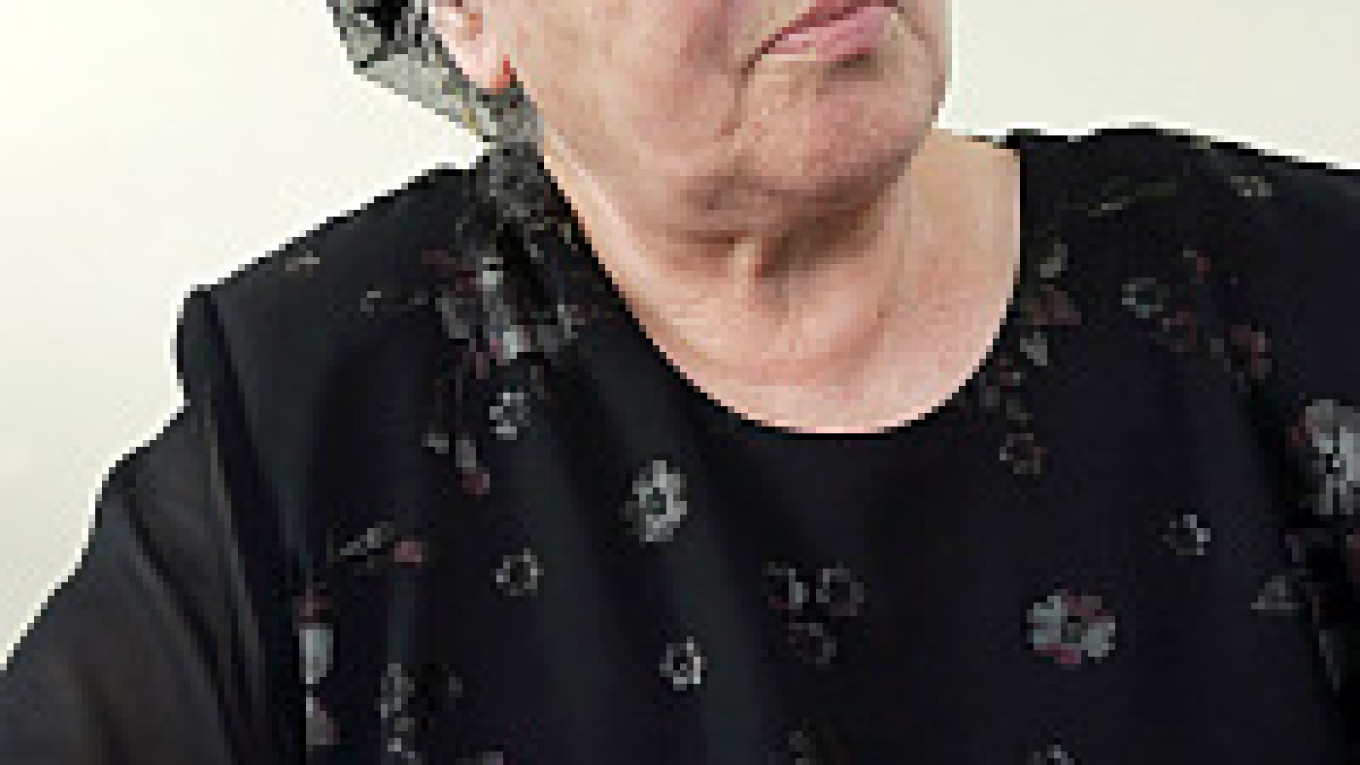The ruling was the first of its kind, and human rights activists said it could provide impetus for thousands of other Russians to file complaints over disappearances. More than 100 disappearance cases related to Chechnya are currently pending in the court.
The European Court of Human Rights in Strasbourg, France, ordered Russia to pay 35,000 euros to the mother of Khadzhi-Murat Yandiyev for violating her son's "right to life" as well as failing "to conduct an effective investigation" into his February 2000 disappearance, according to a statement released by the court.
Key evidence in the case, according to court documents, was video footage filmed by a reporter for NTV and CNN television showing an army officer, later identified by CNN reporters as Colonel-General Alexander Baranov, ordering soldiers to "finish off" and "shoot" Yandiyev.
Baranov has since risen to the rank of general and is now responsible for all Defense Ministry forces in the North Caucasus.
Yandiyev's mother, Fatima Bazorkina, saw the footage on television and filed a complaint against Russia with the European court in April 2001 after being unable to find her son.
Bazorkina awaited Thursday's decision in the Moscow office of the Stichting Russian Justice Initiative, a Dutch human rights organization that represented her in the case.
Appearing exhausted and at times quietly fighting back tears, she said in an interview that "happy" was the wrong word to describe the ruling.
"But I am satisfied," she said. "I think this verdict will help, because if [authorities] refuse to talk to me, at least they will be obliged to answer to the court."
The government is required to pay out the compensation under the European Convention on Human Rights, which it has ratified.
Kremlin spokesman Dmitry Peskov said Thursday afternoon that he could not comment on the decision.
A woman who answered the telephone at the government's press service said only chief spokesman Yevgeny Revenko was authorized to comment, and that Revenko was on vacation and unavailable.
She said any information the government obtained about Thursday's decision would be posted on its web site. No such information had been posted as of late Thursday.
It was unclear what impact the ruling might have on General Baranov.
Defense Ministry spokesman Yury Khvedchin said he could not immediately comment on the court's decision.
Andrei Bobrun, spokesman for the North Caucasus Military District, which is headed up by Baranov, said by telephone from Rostov-on-Don that he was not aware of the decision and could not immediately comment.
The ruling becomes final after three months, or earlier if the parties decide not to appeal to the superior Grand Chamber.
Bazorkina said her son's disappearance stemmed from a tragic misunderstanding. She said Khadzhi left university as soon as the second war in Chechnya broke out in 1999 to search for his father, who he believed was besieged in Grozny but had actually left Chechnya to join Bazorkina at a relative's house in Ingushetia.
"I don't believe he went to fight," Bazorkina said. "In December, he was due to defend his diploma. He would not have taken off like that. He was not interested in politics." Bazorkina said she never saw her son after August 1999.
At a hearing in Strasbourg in 2005, it was not established whether Yandiyev had joined the Chechen rebels.
Human rights activists praised Thursday's decision, saying it gave hope to thousands of others whose relatives have disappeared in Chechnya.
"This case shows a lot of the people who have been victims of violations in Chechnya that it is possible to achieve justice, that it is possible to achieve redress," said Ole Solvang, executive director of the Stichting Russian Justice Initiative.
Tatyana Kasatkina, executive director of the human rights group Memorial, called the ruling "wonderful" and said she hoped the decision would force the government to seriously look into disappearances in Chechnya.
"It's not just about monetary compensation," Kasatkina said. "If a person disappears, he must be searched for. And the best thing that could come from this decision is that people begin to demand investigations of disappearances."
Memorial estimates some 3,000 to 5,000 people have disappeared in Chechnya since 1999, Kasatkina said.
Court spokeswoman Beverley Jacobs said there were currently around 200 cases pending related to human rights violations in Chechnya, more than half of which concerned disappearances.
Most remaining cases involve alleged violations by the Russian military, "including destruction of property, killing and wounding through indiscriminate use of force, use of landmines, illegal detention, torture and inhumane" detention conditions, Jacobs said by e-mail.
Some kidnappings in Chechnya have been blamed on local paramilitary forces loyal to Chechen Prime Minister Ramzan Kadyrov. Interior Ministry troops and federal forces have also been accused of widespread abuses.
A Message from The Moscow Times:
Dear readers,
We are facing unprecedented challenges. Russia's Prosecutor General's Office has designated The Moscow Times as an "undesirable" organization, criminalizing our work and putting our staff at risk of prosecution. This follows our earlier unjust labeling as a "foreign agent."
These actions are direct attempts to silence independent journalism in Russia. The authorities claim our work "discredits the decisions of the Russian leadership." We see things differently: we strive to provide accurate, unbiased reporting on Russia.
We, the journalists of The Moscow Times, refuse to be silenced. But to continue our work, we need your help.
Your support, no matter how small, makes a world of difference. If you can, please support us monthly starting from just $2. It's quick to set up, and every contribution makes a significant impact.
By supporting The Moscow Times, you're defending open, independent journalism in the face of repression. Thank you for standing with us.
Remind me later.


